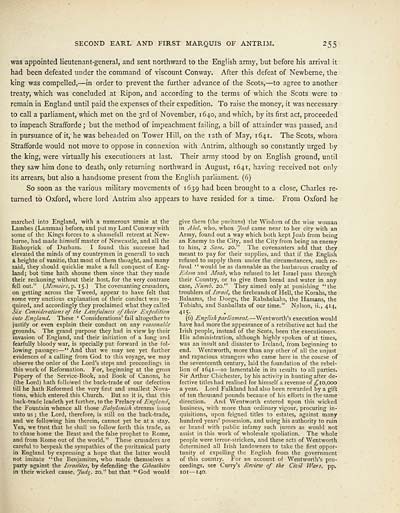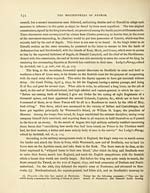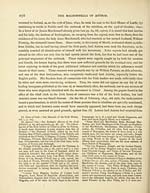Historical account of the Macdonnells of Antrim
(269) Page 255
Download files
Complete book:
Individual page:
Thumbnail gallery: Grid view | List view

SECOND EARL AND FIRST MARQUIS OF ANTRIM.
255
was appointed lieutenant-general, and sent northward to the English army, but before his arrival it
had been defeated under the command of viscount Conway. After this defeat of Newberne, the
king was compelled, — in order to prevent the further advance of the Scots, — to agree to another
treaty, which was concluded at Ripon, and according to the terms of which the Scots were to
remain in England until paid the expenses of their expedition. To raise the money, it was necessary
to call a parliament, which met on the 3rd of November, 1640, and which, by its first act, proceeded
to impeach Strafforde; but the method of impeachment failing, a bill of attainder was passed, and
in pursuance of it, he was beheaded on Tower Hill, on the 12th of May, 1641. The Scots, whom
Strafforde would not move to oppose in connexion with Antrim, although so constantly urged by
the king, were virtually his executioners at last. Their army stood by on English ground, until
they saw him done to death, only returning northward in August, 1641, having received not only
its arrears, but also a handsome present from the English parliament. (6)
So soon as the various military movements of 1639 had been brought to a close, Charles re-
turned to Oxford, where lord Antrim also appears to have resided for a time. From Oxford he
marched into England, with a numerous armie at the
Lambes (Lammas) before, and put my Lord Conway with
some of the Kings forces to a shamefull retreat at New-
burne, had made himself master of Newcastle, and all the
Bishoprick of Durham. I found this successe had
elevated the minds of my countrymen in generall to such
a heighte of vanitie, that most of them thought, and many
said, they should quicklie make a full conquest of Eng-
land; bot time hath shoune them since that they made
their reckoning without their host, for the very contrare
fell out." {Memoirs., p. 15.) The covenanting crusaders,
on getting across the Tweed, appear to have felt that
some very unctious explanation of their conduct was re-
quired, and accordingly they proclaimed what they called
Six Considerations of the Lawfulness of their Expedition
into England. These ' Considerations' fail altogether to
justify or even explain their conduct on any reasonable
grounds. The grand purpose they had in view by their
invasion of England, and their initiation of a long and
fearfully bloody war, is specially put forward in the fol-
lowing passage: — "And that we may see yet further
evidences of a calling from God to this voyage, we may
observe the order of the Lord's steps and proceedings in
this work of Reformation. For, beginning at the gross
Popery of the Service- Book, and Book of Canons, he
(the Lord) hath followed the back-trade of our defection
till he hath Reformed the very first and smallest Nova-
tions, which entered this Church. But so it is, that this
back-trade leadeth yet further, to the Prelacy of England,
the Fountain whence all those Babylonish streams issue
unto us ; the Lord, therefore, is still on the back-trade,
and we following him therein, cannot yet be at a stay.
Yea, we trust that he shall so follow forth this trade, as
to chase home the Beast and the false prophet to Rome,
and from Rome out of the world." These crusaders are
careful to bespeak the sympathies of the puritanical party
in England by expressing a hope that the latter would
not imitate "the Benjamites, who made themselves a
party against the Israelites, by defending the Gibeathites
in their wicked cause, Judg. 20." but that " God would
give them (the puritans) the Wisdom of the wise woman
in Abel, who, when Joab came near to her city with an
Army, found out a way which both kept Joab from being
an Enemy to the City, and the City from being an enemy
to him, 2 Sam. 20." The covenanters add that they
meant to pay for their supplies, and that if the English
refused to supply them under the circumstances, such re-
fusal ' ' would be as damnable as the barbarous cruelty of
Edom and Moab, who refused to let Israel pass through
their Country, or to give them bread and water in any
case, Numb. 20." They aimed only at punishing "the
troublers of Israel, the firebrands of Hell, the Korahs, the
Balaams, the Doegs, the Rabshekahs, the Hamans, the
Tobiahs, and Sanballats of our time." Nnlson, ii., 414,
415-
(6) English parliament. — Wentworth's execution would
have had more the appearance of a retributive act had the
Irish people, instead of the Scots, been the executioners.
His administration, although highly spoken of at times,
was an insult and disaster to Ireland, from beginning to
end. Wentworth, more than any other of all the unjust
and rapacious strangers who came here in the course of
the seventeenth century, laid the foundation of the rebel-
lion of 1641 — so lamentable in its results to all parties.
Sir Arthur Chichester, by his activity in hunting after de-
fective titles had realised for himself a revenue of ^10,000
a year. Lord Falkland had also been rewarded by a gift
of ten thousand pounds because of his efforts in the same
direction. And Wentworth entered upon this wicked
business, with more than ordinary vigour, procuring in-
quisitions, upon feigned titles to estates, against many
hundred years' possession, and using his authority to ruin
or brand with public infamy such jurors as would not
assist in this work of wholesale spoliation. The whole
people were terror-stricken, and these acts of Wentworth
determined all Irish landowners to take the first oppor-
tunity of expelling the English from the government
of this country. For an account of Wentworth's pro-
ceedings, see Curry's Review of the Civil Wars, pp.
101 — 140.
255
was appointed lieutenant-general, and sent northward to the English army, but before his arrival it
had been defeated under the command of viscount Conway. After this defeat of Newberne, the
king was compelled, — in order to prevent the further advance of the Scots, — to agree to another
treaty, which was concluded at Ripon, and according to the terms of which the Scots were to
remain in England until paid the expenses of their expedition. To raise the money, it was necessary
to call a parliament, which met on the 3rd of November, 1640, and which, by its first act, proceeded
to impeach Strafforde; but the method of impeachment failing, a bill of attainder was passed, and
in pursuance of it, he was beheaded on Tower Hill, on the 12th of May, 1641. The Scots, whom
Strafforde would not move to oppose in connexion with Antrim, although so constantly urged by
the king, were virtually his executioners at last. Their army stood by on English ground, until
they saw him done to death, only returning northward in August, 1641, having received not only
its arrears, but also a handsome present from the English parliament. (6)
So soon as the various military movements of 1639 had been brought to a close, Charles re-
turned to Oxford, where lord Antrim also appears to have resided for a time. From Oxford he
marched into England, with a numerous armie at the
Lambes (Lammas) before, and put my Lord Conway with
some of the Kings forces to a shamefull retreat at New-
burne, had made himself master of Newcastle, and all the
Bishoprick of Durham. I found this successe had
elevated the minds of my countrymen in generall to such
a heighte of vanitie, that most of them thought, and many
said, they should quicklie make a full conquest of Eng-
land; bot time hath shoune them since that they made
their reckoning without their host, for the very contrare
fell out." {Memoirs., p. 15.) The covenanting crusaders,
on getting across the Tweed, appear to have felt that
some very unctious explanation of their conduct was re-
quired, and accordingly they proclaimed what they called
Six Considerations of the Lawfulness of their Expedition
into England. These ' Considerations' fail altogether to
justify or even explain their conduct on any reasonable
grounds. The grand purpose they had in view by their
invasion of England, and their initiation of a long and
fearfully bloody war, is specially put forward in the fol-
lowing passage: — "And that we may see yet further
evidences of a calling from God to this voyage, we may
observe the order of the Lord's steps and proceedings in
this work of Reformation. For, beginning at the gross
Popery of the Service- Book, and Book of Canons, he
(the Lord) hath followed the back-trade of our defection
till he hath Reformed the very first and smallest Nova-
tions, which entered this Church. But so it is, that this
back-trade leadeth yet further, to the Prelacy of England,
the Fountain whence all those Babylonish streams issue
unto us ; the Lord, therefore, is still on the back-trade,
and we following him therein, cannot yet be at a stay.
Yea, we trust that he shall so follow forth this trade, as
to chase home the Beast and the false prophet to Rome,
and from Rome out of the world." These crusaders are
careful to bespeak the sympathies of the puritanical party
in England by expressing a hope that the latter would
not imitate "the Benjamites, who made themselves a
party against the Israelites, by defending the Gibeathites
in their wicked cause, Judg. 20." but that " God would
give them (the puritans) the Wisdom of the wise woman
in Abel, who, when Joab came near to her city with an
Army, found out a way which both kept Joab from being
an Enemy to the City, and the City from being an enemy
to him, 2 Sam. 20." The covenanters add that they
meant to pay for their supplies, and that if the English
refused to supply them under the circumstances, such re-
fusal ' ' would be as damnable as the barbarous cruelty of
Edom and Moab, who refused to let Israel pass through
their Country, or to give them bread and water in any
case, Numb. 20." They aimed only at punishing "the
troublers of Israel, the firebrands of Hell, the Korahs, the
Balaams, the Doegs, the Rabshekahs, the Hamans, the
Tobiahs, and Sanballats of our time." Nnlson, ii., 414,
415-
(6) English parliament. — Wentworth's execution would
have had more the appearance of a retributive act had the
Irish people, instead of the Scots, been the executioners.
His administration, although highly spoken of at times,
was an insult and disaster to Ireland, from beginning to
end. Wentworth, more than any other of all the unjust
and rapacious strangers who came here in the course of
the seventeenth century, laid the foundation of the rebel-
lion of 1641 — so lamentable in its results to all parties.
Sir Arthur Chichester, by his activity in hunting after de-
fective titles had realised for himself a revenue of ^10,000
a year. Lord Falkland had also been rewarded by a gift
of ten thousand pounds because of his efforts in the same
direction. And Wentworth entered upon this wicked
business, with more than ordinary vigour, procuring in-
quisitions, upon feigned titles to estates, against many
hundred years' possession, and using his authority to ruin
or brand with public infamy such jurors as would not
assist in this work of wholesale spoliation. The whole
people were terror-stricken, and these acts of Wentworth
determined all Irish landowners to take the first oppor-
tunity of expelling the English from the government
of this country. For an account of Wentworth's pro-
ceedings, see Curry's Review of the Civil Wars, pp.
101 — 140.
Set display mode to:
![]() Universal Viewer |
Universal Viewer | ![]() Mirador |
Large image | Transcription
Mirador |
Large image | Transcription
Images and transcriptions on this page, including medium image downloads, may be used under the Creative Commons Attribution 4.0 International Licence unless otherwise stated. ![]()
| Histories of Scottish families > Historical account of the Macdonnells of Antrim > (269) Page 255 |
|---|
| Permanent URL | https://digital.nls.uk/95344475 |
|---|
| Description | A selection of almost 400 printed items relating to the history of Scottish families, mostly dating from the 19th and early 20th centuries. Includes memoirs, genealogies and clan histories, with a few produced by emigrant families. The earliest family history goes back to AD 916. |
|---|

